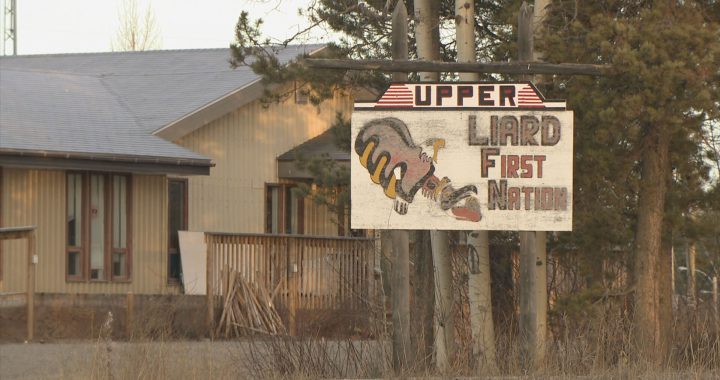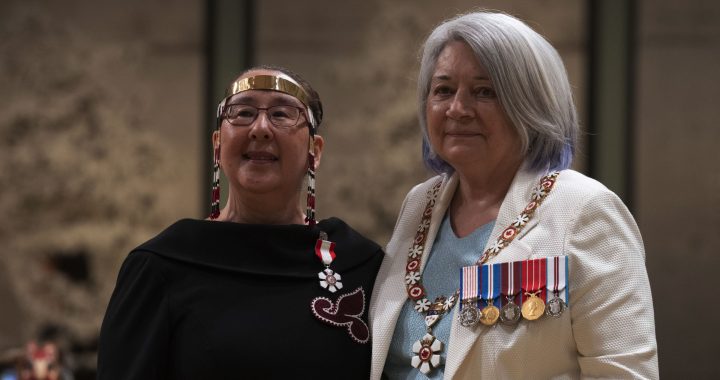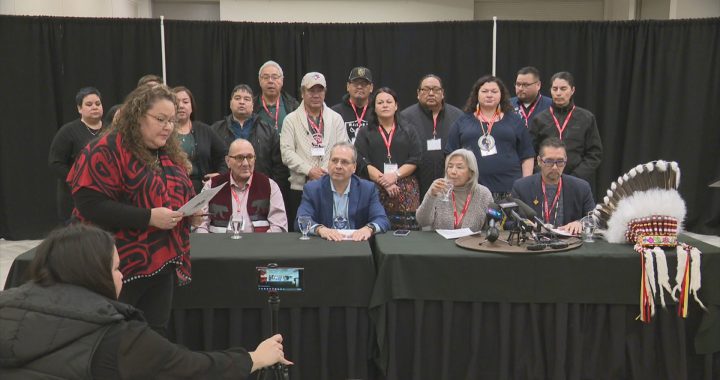Three years after a tugboat owned by a company based in Houston, Tx., sank off the B.C. coast, the Heiltsuk Nation says it is still unable to fish the waters.
“Different things that we harvested there include black cod, clams, cockels, crab, halibut, herring and kelp, ling cod, rock cod, and various species of salmon,” said Chief Marilyn Slett.
“We have one grocery store in our community and we are accessible by boat and by plane so for us having a healthy ocean a healthy eco system is really important.”
In October 2016, the Nathan E. Stewart spilled 110,000 litres of diesel and heavy oils.
Transportation Safety Board ruled last year a crew member missed a planned course change because he fell asleep while alone on watch.
The company was fined this week $2.9 million for the damage.
The money will go into Canada’s environmental defence fund.
It’s not clear if the community will see any of that money.
The spill has devastated one of the Heiltsuk Nation’s traditional harvesting sites.
Lawyer Brock Martland represented the Heiltsuk Nation at the company’s sentencing hearing.
“The court heard from a number of members from the Heiltsuk community about the gravity of the impact of this oil spill on them and their community and on the environment,” says Martland.
The Heiltsuk Nation still can’t eat any of the food near the spill site.
Slett says no amount of money can replace what’s been lost.
“The effects it’s had our people I suspect will continue to feel that going forward you know we felt hurt, a deep sense of loss,” said Slett. “We felt helpless to what was happening and you with the company the polluter not conducting any environmental impact assessment we also feel a lot of uncertainty around the health of the spill area.”
According to Martland, the amount awarded in this case is the highest fine ever given to a company that had this type of an environmental disaster.
Meanwhile the Heiltsuk Nation is currently launching its own lawsuit against Kirby Off Shore.
Martland is not representing the Heiltsuk on that case but says through discussions with the community about the impacts of the spill.
“The Heiltsuk Nation is looking for re-dress from the company because of what happened more broadly they want even more effective spill response measures put in place in particular from the federal government,” he said.
“The response time and the level of response was woefully lacking from the Heiltsuk point of view and they want to see the system improved in the future”, said Martland.
Kirby Corp. had pleaded guilty to three of nine counts while a civil case for damages filed by the Heiltsuk Nation is ongoing.
The guilty pleas are related to separate counts under the Fisheries Act, the Migratory Birds Convention Act and the Pilotage Act for the fuel spill that damaged both fish and birds, and for failing to have a pilot aboard the vessel.
Read More:
Report on grounded tug, oil spill in B.C. released
Beaches were contaminated just when the community was preparing for a commercial clam fishery that would have supported 50 families and no traditional marine harvesting has since been done in the area, Slett said.
Kirby has yet to do an environmental impact assessment to determine the state of the spill site as the Heiltsuk continue to use their own resources to conduct research, she said, adding the village site used by five tribes that are part of the nation was previously “pristine.”
Slett said she’s concerned about the lack of an adequate oil spill response system nearly three years after the spill despite an Oceans Protection Plan announced by the federal government in 2016 in connection with the planned Trans Mountain pipeline expansion.
“The state of marine response today is still the same. Until we are able to come to agreements and partnerships around including Indigenous communities in marine response in the central coast the Heiltsuk community is still very much in a vulnerable position,” she said.
The Heiltsuk Nation has been in discussions with Transport Canada and the coast guard to provide resources to First Nations first responders in case of another spill due to concerns that a contractor did not arrive on site until the evening, hours after the early-morning incident in 2016, Slett said.
With files from the Canadian Press











Perfect example of Justin’s world class oil-spill cleanup support. One would think all the big money oil spill cleanup takers would be honing their skills. Instead, it looks like the only skills they are working on is getting Liberal government grants and subsidies.